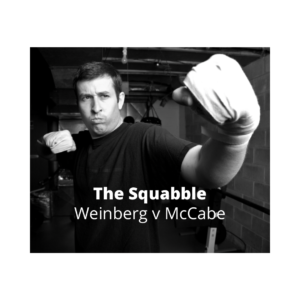The Squabble
 Once we begin studying the battles of Jacob’s life, I naturally consider rereading Nikolai Gogol’s, “The Squabble.”
Once we begin studying the battles of Jacob’s life, I naturally consider rereading Nikolai Gogol’s, “The Squabble.”
As mentioned in “Jacob’s Chanukah Journey,” I’ve been finding myself trapped in Introductions and Forwards, and Patrick McCabe’s essay reflecting on “The Squabble,” has me stuck in the boxing ring ready for a round with one of the most brilliant authors in the world.
I gratefully hear your pleas to not step in the ring with someone far more skilled and imaginative. However, too much is on the line for me to bow to the obvious. The fight must go on!
Reason 1:
As a recent election supported Bertrand Russell’s statement, “War does not prove who is right; only who is left (sorry, I couldn’t resist the double entendre)!” Even if the better writer wins, it will not prove that he is right.
I also hope that Eric, Does Santa Exist, Kaplan, will come to my aid as he is so expert in comedy.
Reason 2:
Chanukah teaches us to engage in unwinnable battles if all we stand for is at stake. I fear that Mr. McCabe’s approach to understanding Gogol is dangerous for Torah study.
My Squabble with Patrick McCabe:
Gogol’s The Squabble is considered a masterpiece of sublime tragicomedy ridiculing our preoccupation with the petty.
Neighbors Ivan Ivanovich and Ivan Nikiforovich are the best of friends until the latter, in the heat of the moment – on a stifling hot day – refers to his friend as a goose. The two become sworn enemies and fight it out in court for years and years until both die.
When I read of the neighbors desperately trying to convince the two to talk and heal their rift I recall how as a little boy I asked my father zt”l why Yitzchak and Rivka couldn’t directly speak to their sons about their “squabbles.”
My father’s response was my first trip in a time machine back to, pick up Rashi, and then further back in time to a story in Chumash (a skill I regularly have to use as the star reporter for the BNN). We didn’t just go back to when the two brothers were growing up; we went back to Rivka’s quest at the Yeshiva of Shem and Ever.
My father used the trip to teach me that we could not deal with any story in the Chumash as just another human interest story; we had to understand people functioning with the appreciation of the eternal consequences of their actions.
Mr. McCabe uses string theory to explain the (multi) universal truth of human behavior, insisting that such issues certainly arise in every universe. “… if The Squabble is purely humorous, then I am afraid that it is incumbent upon me shamefully to disclose that as I delicately withdraw my writing instrument from its obligingly accommodating ink-pot, I do so with the commendably sculpted talons of a webbed foot – for I am a goose, dear reader, or, if you prefer, a gander.” (Now do you appreciate why this is not a master of words with whom I should duel?!)
I dare not take issue with his powerful insight into The Squabble, however, I fear Mr. McCabe would apply the same approach to Jacob and Esau; seeing an all too human tragedy develop in a tragicomic series of misunderstandings, something so basic that it will exist in every universe, without appreciating that Bible stories are not stuff of novels but invitations to touch all the universes of which Mr. McCabe speaks with a sense of eternal life.
The truths of Torah are universal, but they are not tales of human behavior. They are lessons in the battle to perfect God’s Creation that we can apply to our own very human behavior.
I have no idea how Patrick McCabe reads Bible stories, or, for that matter, if he does. I am grateful for the many hours of pleasurable reading and the magical music of his writing. I am also grateful for his serving as my straw-man for a difficult question:
I love using literature to help me better share an important thought about Torah, but I never want to equate that written by a human hand and the Eternal Wisdom of Torah. In fact….
To be, with God’s help, continued…


